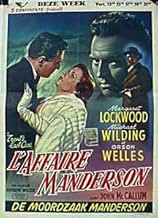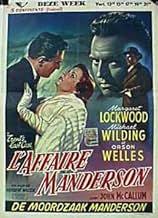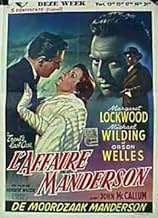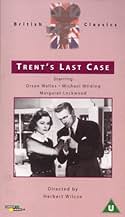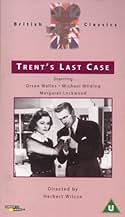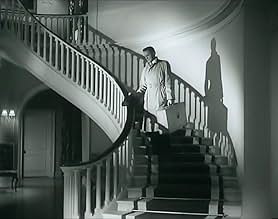Agrega una trama en tu idiomaA reporter investigates a rich businessman's death. While police rule it suicide, Trent believes it's murder and grows intrigued by the widow and secretary.A reporter investigates a rich businessman's death. While police rule it suicide, Trent believes it's murder and grows intrigued by the widow and secretary.A reporter investigates a rich businessman's death. While police rule it suicide, Trent believes it's murder and grows intrigued by the widow and secretary.
- Dirección
- Guionistas
- Elenco
Geoffrey Bayldon
- Reporter in Court
- (sin créditos)
Ernest Blyth
- Concert Attendee
- (sin créditos)
Robert Cawdron
- Police Constable
- (sin créditos)
John Chandos
- Tim O'Reilly
- (sin créditos)
Anthony Collins
- Conductor
- (sin créditos)
Henry Edwards
- Coroner
- (sin créditos)
Eileen Joyce
- Pianist
- (sin créditos)
Ben Williams
- Jimmy - Reporter
- (sin créditos)
Kenneth Williams
- Horace Evans
- (sin créditos)
- Dirección
- Guionistas
- Todo el elenco y el equipo
- Producción, taquilla y más en IMDbPro
Opiniones destacadas
Surprisingly for me, this is a remake of a movie based on a novel written in 1913 or whereabouts. Surprisingly, because the plot is nothing special, a sort of opposite-gender "Leave her to Heaven", but a lot more lackluster.
Michael Wilding is the titular Trent, a bland and moderately charming artist-journalist (?) investigating the bizarre suicide of unpleasant billionaire Sigsbee (???) Manderson. What with the weird name? Anyway, after a coroner's verdict of suicide, Trent is intrigued by allegations of Manderson's wife having an affair with her husband's dashing secretary.
Lockwood plays the wife and she's the only substantial and charming presence in the movie. There is a lot of talk and only by the third act we get to see Orson Welles with bushy eyebrows and prosthetic nose as Sigsbee and he's indeed a malevolent character but also very grotesque, due to the ridiculous disguise.
After long explanations from all the players the movie ends on a happy, albeit forced, note.
Due to Welles appearing so late and to take advantage of the popularity of an earlier film, in Italy this was titled "The Third Man Returns", even if it has nothing to do with that masterpiece.
Michael Wilding is the titular Trent, a bland and moderately charming artist-journalist (?) investigating the bizarre suicide of unpleasant billionaire Sigsbee (???) Manderson. What with the weird name? Anyway, after a coroner's verdict of suicide, Trent is intrigued by allegations of Manderson's wife having an affair with her husband's dashing secretary.
Lockwood plays the wife and she's the only substantial and charming presence in the movie. There is a lot of talk and only by the third act we get to see Orson Welles with bushy eyebrows and prosthetic nose as Sigsbee and he's indeed a malevolent character but also very grotesque, due to the ridiculous disguise.
After long explanations from all the players the movie ends on a happy, albeit forced, note.
Due to Welles appearing so late and to take advantage of the popularity of an earlier film, in Italy this was titled "The Third Man Returns", even if it has nothing to do with that masterpiece.
I was pleasantly surprised by this film. I fail to understand why so many people have criticized it. I thought the entire peace of work was brilliant! Orson Welles gives a stirring and chilling performance as an insane cynical business man. I especially loved the fact that his presence remains quite strong through out the entirety of the film. The story reeks of the talent of Orson Welles. I am surprised that he did not direct the peace himself. We follow the story of a young new reporter looking for the story of a life time. He finds such a story within the home of a black widow, brilliantly played by Margret Lockwood. As i have stated many times, Margret Lockwood never ceases to amaze me with her subtle, but layered performances. She manages here to evoke a certain dismalness that cannot go unnoticed. She plays a rather mellow and unfeeling part. Frankly, her character is really not all that interesting. Margret plays her part well, but the part is very limited. The main focus is the character of Trent, a savvy and sly man who will stop it nothing to find the truth. This film is a classic murder mystery, produced in a citizen Kane manner. The flash back sequences are very well crafted, as well the plot and story structure. The other characters are also quite interesting. The character of Marlow is perhaps the victim of this tale and probably the most sympathetic of all characters. However,the ending is rather cliché and slightly destroys the tone of the film. I do recommend this film though on so many levels. If you want a good mystery story, as well as some good acting, then sit back and enjoy!
MICHAEL WILDING is an armchair detective who sets out to determine whether or not the death of ORSON WELLES was suicide or murder. He thinks he's solved the case, only to learn that all is not what it appears (without giving the outcome away).
Unfortunately, the script is a dreary, talky and ponderous, making the film appear to be an amateurish stage play, although based on a novel. It's static. Nothing at all cinematic about the approach, nor is there any imagination in the directing.
Of all the players, MARGARET LOCKWOOD as the beautiful wife of the deceased man and JOHN McCALLUM as the man's secretary have key roles that they play with assurance. ORSON WELLES, with fake nose and bushy brows, might as well have been from another film. His ten or fifteen minutes of time on screen renders nothing but ham. Director Herbert Wilcox was evidently unable to tone him down and as a result his key scenes throw the film off stride. MICHAEL WILDING has a colorless role as the newspaper reporter who suspects foul play but can't prove anything.
With a talky script and lack of any cinematic touches, TRENT'S LAST CASE goes nowhere fast and leaves the viewer expecting a strong twist that never arrives--instead, a flat ending.
Production values are fine even though the film comes from the usually low-budget Republic studios.
Unfortunately, the script is a dreary, talky and ponderous, making the film appear to be an amateurish stage play, although based on a novel. It's static. Nothing at all cinematic about the approach, nor is there any imagination in the directing.
Of all the players, MARGARET LOCKWOOD as the beautiful wife of the deceased man and JOHN McCALLUM as the man's secretary have key roles that they play with assurance. ORSON WELLES, with fake nose and bushy brows, might as well have been from another film. His ten or fifteen minutes of time on screen renders nothing but ham. Director Herbert Wilcox was evidently unable to tone him down and as a result his key scenes throw the film off stride. MICHAEL WILDING has a colorless role as the newspaper reporter who suspects foul play but can't prove anything.
With a talky script and lack of any cinematic touches, TRENT'S LAST CASE goes nowhere fast and leaves the viewer expecting a strong twist that never arrives--instead, a flat ending.
Production values are fine even though the film comes from the usually low-budget Republic studios.
This viewer is not exactly a devotee of the films of Herbert Wilcox but this one is not at all bad. E. C. Bentley had intended his novel to be a parody and although Wilcox has chosen to play it straight one cannot actually take it too seriously. This director's notable lack of flamboyance happens to suit this rather innocuous, teddibly civilised period piece very well.
It is presented by Republic Pictures for whom Orson Welles had made his bizarre 'Macbeth.' One is intrigued by his third billing and eagerly awaits his appearance. It is certainly worth the wait as his Mephistophelian presence and basso profundo are absolutely magnetic. It seems as if we are suddenly in an entirely different film and one is hardly surprised to learn that Welles wrote and directed his own scenes!
As for the rest of the film we have the debonair Michael Wilding, certainly no stranger to Wilcox, who is well cast as Bentley's engaging amateur sleuth of the title. Playing the widow of the millionaire who is assumed to have committed suicide, although Trent suspects foul play, is Margaret Lockwood. It is far more difficult to play 'good' than 'bad' and Miss Lockwood is more effective when playing the latter. The same comment would also apply to John McCallum as the prime suspect. The delightful Miles Malleson is, well.....Miles Malleson!
There is splendid use made of the Larghetto from Mozart's C minor piano concerto which suits the melancholy mood of the film.
By far the best scene(surprise, surprise) is one directed and wonderfully lit by Welles in which he and John McCallum discuss Shakespeare's depiction of a husband's jealousy in 'Othello'. Welles remarks that he had recently seen this play performed at St. James's Theatre and was none too keen on the leading actor. He is of course referring to, yes, you've guessed it........ himself!
It is presented by Republic Pictures for whom Orson Welles had made his bizarre 'Macbeth.' One is intrigued by his third billing and eagerly awaits his appearance. It is certainly worth the wait as his Mephistophelian presence and basso profundo are absolutely magnetic. It seems as if we are suddenly in an entirely different film and one is hardly surprised to learn that Welles wrote and directed his own scenes!
As for the rest of the film we have the debonair Michael Wilding, certainly no stranger to Wilcox, who is well cast as Bentley's engaging amateur sleuth of the title. Playing the widow of the millionaire who is assumed to have committed suicide, although Trent suspects foul play, is Margaret Lockwood. It is far more difficult to play 'good' than 'bad' and Miss Lockwood is more effective when playing the latter. The same comment would also apply to John McCallum as the prime suspect. The delightful Miles Malleson is, well.....Miles Malleson!
There is splendid use made of the Larghetto from Mozart's C minor piano concerto which suits the melancholy mood of the film.
By far the best scene(surprise, surprise) is one directed and wonderfully lit by Welles in which he and John McCallum discuss Shakespeare's depiction of a husband's jealousy in 'Othello'. Welles remarks that he had recently seen this play performed at St. James's Theatre and was none too keen on the leading actor. He is of course referring to, yes, you've guessed it........ himself!
This is pure whodunit,in the grand tradition of Agatha Christie and there are similarities with the lady of crime's "murder on the links" ,but the solution is not as brilliant as hers ,because in this field,she has no equal.
Anyway ,everyone who likes Christie will relish .A desirable mansion ,where a man took his own life (or was it murder?) and suspects including two secretaries,one of whom may be in love with the dead's wife and the other one may be jealous.But the main asset of the movie is the wealthy (suicidal?) businessman ,masterfully portrayed by Orson Welles whom we only see in flashbacks :the scene when we hear his formidable voice ,but only the back of his armchair gives the jitters. Michael Wilding has no gray cells,but he displays flair for clues ,as though he had be trained by Hercule Poirot.Entertaining whodunit.
Anyway ,everyone who likes Christie will relish .A desirable mansion ,where a man took his own life (or was it murder?) and suspects including two secretaries,one of whom may be in love with the dead's wife and the other one may be jealous.But the main asset of the movie is the wealthy (suicidal?) businessman ,masterfully portrayed by Orson Welles whom we only see in flashbacks :the scene when we hear his formidable voice ,but only the back of his armchair gives the jitters. Michael Wilding has no gray cells,but he displays flair for clues ,as though he had be trained by Hercule Poirot.Entertaining whodunit.
¿Sabías que…?
- TriviaIn the film, Sigsbee Manderson (played by Orson Welles) mentions a performance of Shakespeare's "Othello" at the St. James Theatre in London in 1951, in which he disliked the leading actor's performance. This is an in-joke: Welles himself played Othello at the St. James in 1951, under his own direction. Peter Finch played Iago opposite him.
- ErroresDuring the coroners inquest, Trent was seen drawing a sketch of Marlowe. This is not allowed in English Courts. Although court artists are allowed in as members of the public, all drawings must be done by memory outside the courtroom.
- Citas
Margaret Manderson: He talks of reopening the case.
John Marlowe: You should've ordered him out of the house.
Margaret Manderson: And confirm his suspicions?
- Bandas sonorasPiano Concerto in C Minor
Music by Wolfgang Amadeus Mozart (as Mozart)
Arranged and Conducted by Anthony Collins (uncredited)
Performed by Eileen Joyce
Selecciones populares
Inicia sesión para calificar y agrega a la lista de videos para obtener recomendaciones personalizadas
Detalles
- Fecha de lanzamiento
- País de origen
- Idioma
- También se conoce como
- Trentov poslednji slucaj
- Productora
- Ver más créditos de la compañía en IMDbPro
- Tiempo de ejecución
- 1h 30min(90 min)
- Color
- Relación de aspecto
- 1.37 : 1
Contribuir a esta página
Sugiere una edición o agrega el contenido que falta

